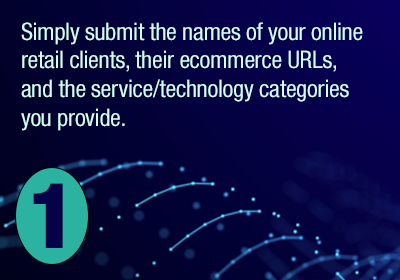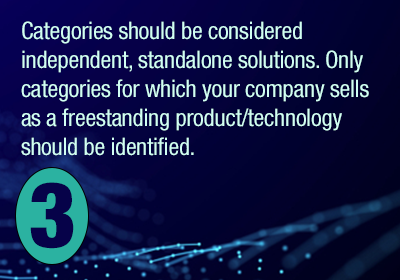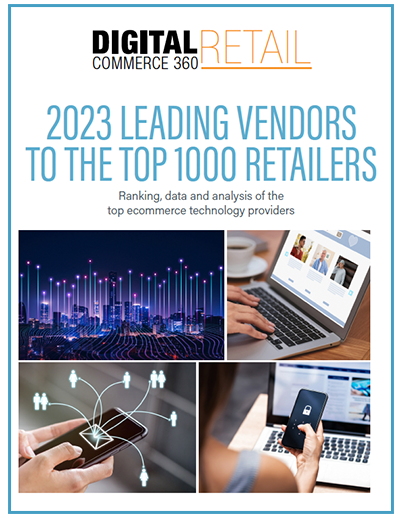Top Ecommerce Vendors Rankings
We realize some vendor/retailer relationships have NDAs which limit the information that can be shared. We welcome working with you to identify your clients who don’t have such restrictions.
*Digital Commerce 360 (Vertical Web Media) reserves all rights to check for completion and accuracy of data submitted.
Get Recognized in the Leading Vendors to the Top 1000
Become a recognized ecommerce partner to online retailers large and small!
Share your B2C ecommerce retailer client roster with Digital Commerce 360 and get:
- Valuable exposure as a preferred partner to online retailers
- Inclusion in our reporting of thousands of global retailers, increasing your company’s exposure
- Possible recognition in our highly anticipated Leading Vendors to the Top 1000 Retailers annual report
If you have questions or you want to connect with our team, feel free to email us and one of our team members will be in touch soon!
Vendor Categories
The categories listed below should be considered independent, standalone solutions. Only categories for which your company sells as a freestanding product/technology should be identified. For example, if you offer an ecommerce platform that includes order management, but clients can’t purchase standalone order management software from you, you should not note order management.
**Vendor category is tracked, but NOT part of Leading Vendor Rankings
Affiliate Marketing
A marketing arrangement by which an online retailer pays a commission to an external website for traffic or sales generated from its referrals.
Channel Management
Technology and services that help sellers list products and establish webstores on a marketplace. Services can include providing product descriptions/product feeds and multi-channel management, among others. Also includes vendors that prepare and monitor product data flow to online price comparison platforms and shopping marketplaces.
Content Delivery Network
A system that copies the pages of a website to geographically dispersed servers. When a page is requested, content is identified and served from the closest server to the users, enabling faster delivery.
Content Management Systems
Technology that addresses the creation, review, approval and publishing processes of web-based content.
Customer Relationship Management
Customer relationship management, or CRM, manages all aspects of interaction a company has with its customers.
Customer Reviews & Ratings
Technology that enables customer ratings and reviews of products posted on a retailer’s or manufacturer’s website.
Customer Service Software & Support
Provides access to customer purchasing and support history as well as access to product purchasing information from purchase to delivery. Also includes web services that enable businesses to communicate, or chat, in real time with visitors to their websites as well as vendors that supply loyalty, coupon and incentive programs.
Ecommerce Platform
Technology that provides a combination of operating system software, hardware and individual tools that enable online shopping.
Fulfillment Services
Labor-based services such as warehousing, packaging, delivery and return/exchange processing. Includes 3PLs.
Fulfillment Software
Technology and applications that automate the fulfillment process to help an online retailer receive, warehouse, package, ship, exchange and return orders.
International Ecommerce Services
Cross-border processing of an order which could include parcel shipments, delivery, order fulfillment, returns and currency conversion.
Marketing Automation Platform
Technology that automatically manages marketing processes and campaigns across multiple channels such as email, apps, web and text channels.
Mobile Commerce**
Technology that enables ecommerce transactions to be conducted on mobile devices such as smartphones and tablets.
Online Advertising
Solutions retailers use to help them manage or conduct their online or offline advertising or marketing services.
Order Management
Software that helps merchants process, track and manage orders.
Payment Processing
Technology that automates payment processing for ecommerce transactions.
Payment Security/Fraud Prevention
Services that offer online customer payment security tools that protect the consumer’s personal data and provide a retailer with fraud detection support.
Personalization
The process of creating customized experiences for visitors to a website. Rather than providing a single, broad experience, website personalization allows retailers to present site visitors with unique experiences tailored to their needs and desires.
Pricing Intelligence/Optimization**
The use of detailed analytics to create and optimize a retailer’s pricing strategy.
Product Information Management**
Technology that collects, evaluates, stores, manages and distributes accurate and up-to-date product information across a company’s selling channels, providing the information that sellers want to market and that customers need to make purchasing decisions. PIM often also encompasses Digital Asset Management (DAM) which manages information on such digital assets as images, videos, computer-aided design (CAD) drawings, audio files, graphics and documents. Other related terms are Product Data Management (PDM) and Product Lifecycle Management (PLM), which manage information on products during the development and manufacturing stages until they’re ready for marketing and sales.
Sales Tax Management**
Software that manages sales tax calculation and compliance.
Search Engine Marketing
Paid search and organic search software and services designed to increase exposure to internet search engines. Vendors offering paid and organic search software and services designed to increase exposure to internet search engines.
Security Certification**
Service providers that offer a secure web connection by Single Socket Layer (SSL) protocol in an effort to protect a consumer’s personal data.
Shipping Carrier
Transportation companies that deliver an online retailer’s goods to consumers.
Site Design & Development
Services including planning, creating, building and maintaining ecommerce sites. Also includes companies that provide a range of interactive technologies like video, audio, dynamic imaging, augmented/virtual reality or other elements that encourage visitors to interface and engage with site content.
Site Search
Software that organizes and presents website content and also tracks how site visitors use the tool, such as by analyzing keywords.
Social Media Marketing
The use of social media platforms as marketing tools to place messages and track consumer use of company and product names.
Web Analytics**
The measurement, collection, analysis and reporting of web data for the purposes of understanding and optimizing web usage. Metrics studied include how many people visited a site, how they came to the site and what keywords they search while using the site’s search engine, among many others.
Web Hosting/Cloud Services
Includes cloud computing services for building, testing, deploying, and managing applications and services through a network of managed data centers. Also includes web hosting vendors that operate website data servers either at a data center or a co-location facility.
Website Performance
The process of using controlled experimentation to improve a website’s ability to achieve business goals as well as metrics that provide a business with knowledge of its website’s performance.



